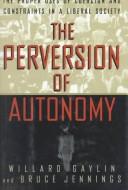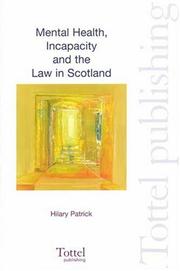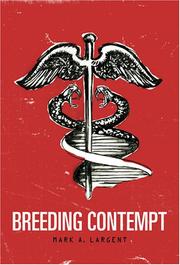| Listing 1 - 10 of 63 | << page >> |
Sort by
|

ISBN: 0684827840 Year: 1996 Publisher: New York Free Press
Abstract | Keywords | Export | Availability | Bookmark
 Loading...
Loading...Choose an application
- Reference Manager
- EndNote
- RefWorks (Direct export to RefWorks)
Civil society --- Individualism --- Involuntary treatment --- Libertarianism --- Social ethics
Book
Year: 1994 Publisher: Rockville, MD : U.S. Department of Health and Human Services, Public Health Service, National Institutes of Health, National Institute on Drug Abuse,
Abstract | Keywords | Export | Availability | Bookmark
 Loading...
Loading...Choose an application
- Reference Manager
- EndNote
- RefWorks (Direct export to RefWorks)
Drug abuse --- Involuntary treatment --- Drug abuse and crime --- Treatment

ISBN: 1845920627 9781845920623 Year: 2006 Publisher: Haywards Heath Tottel
Abstract | Keywords | Export | Availability | Bookmark
 Loading...
Loading...Choose an application
- Reference Manager
- EndNote
- RefWorks (Direct export to RefWorks)
Involuntary treatment --- Mental health laws --- Mentally ill --- Law and legislation --- Commitment and detention

ISBN: 1281151424 9786611151423 0813543800 9780813543802 9781281151421 6611151427 9780813541822 0813541824 9780813541839 0813541832 Year: 2007 Publisher: New Brunswick, NJ
Abstract | Keywords | Export | Availability | Bookmark
 Loading...
Loading...Choose an application
- Reference Manager
- EndNote
- RefWorks (Direct export to RefWorks)
Most closely associated with the Nazis and World War II atrocities, eugenics is sometimes described as a government-orchestrated breeding program, other times as a pseudo-science, and often as the first step leading to genocide. Less frequently it is recognized as a movement having links to the United States. But eugenics does have a history in this country, and Mark A. Largent tells that story by exploring one of its most disturbing aspects, the compulsory sterilization of more than 64,000 Americans. The book begins in the mid-nineteenth century, when American medical doctors began advocating the sterilization of citizens they deemed degenerate. By the turn of the twentieth century, physicians, biologists, and social scientists championed the cause, and lawmakers in two-thirds of the United States enacted laws that required the sterilization of various criminals, mental health patients, epileptics, and syphilitics. The movement lasted well into the latter half of the century, and Largent shows how even today the sentiments that motivated coerced sterilization persist as certain public figures advocate compulsory birth control-such as progesterone shots for male criminals or female welfare recipients-based on the same assumptions and motivations that had brought about thousands of coerced sterilizations decades ago.
Eugenics --- Involuntary sterilization --- Castration of criminals and defectives --- Compulsory sterilization --- Eugenic sterilization --- Sterilization, Eugenic --- Sterilization of criminals and defectives --- Involuntary treatment --- Sterilization (Birth control) --- Reproductive rights --- History.
Book
Publisher: Washington
Abstract | Keywords | Export | Availability | Bookmark
 Loading...
Loading...Choose an application
- Reference Manager
- EndNote
- RefWorks (Direct export to RefWorks)
Birth control --- Abortion --- Sterilization (Birth control) --- Involuntary treatment --- Women's rights --- Human rights --- Government policy --- Government policy --- United Nations Population Fund. --- China --- Population policy.
Book
ISBN: 9781469675862 9781469675879 Year: 2023 Publisher: S.l. University of North Carolina Press
Abstract | Keywords | Export | Availability | Bookmark
 Loading...
Loading...Choose an application
- Reference Manager
- EndNote
- RefWorks (Direct export to RefWorks)
"In this sweeping history of reproductive surgery in Mexico, Elizabeth O'Brien traces the interstices of religion, reproduction, and obstetric racism from the end of the Spanish empire through the post-revolutionary 1930s. Examining medical ideas about operations (including cesarean section, abortion, hysterectomy, and eugenic sterilization), Catholic theology, and notions of modernity and identity, O'Brien argues that present-day claims about fetal personhood are rooted in the use of surgical force against marginalized and racialized women. This history illuminates the theological, patriarchal, and epistemological roots of obstetric violence and racism today. O'Brien illustrates how ideas about maternal worth and unborn life developed in tandem. Eighteenth-century priests sought to save unborn souls through cesarean section, while nineteenth-century doctors aimed to salvage some unmarried women's social reputations via therapeutic abortion. By the twentieth century, eugenicists wished to regenerate the nation's racial profile, in part by sterilizing women in public clinics. The belief that medical interventions could redeem women, children, and the nation is what O'Brien refers to as 'salvation though surgery.' As operations acquired racial and religious significances, Indigenous, Afro-Mexican, and mixed-race people's bodies became sites for surgical experimentation. Even during periods of Church-state conflict, O'Brien argues, the religious valences of experimental surgery manifested in embodied expressions of racialized, and often-coercive, medical science"--
Obstetrics --- Women's health services --- Racism in medicine --- Human experimentation in medicine --- Involuntary treatment --- Surgery&delete& --- History --- Surgery --- Social aspects --- Religious aspects
Book
Year: 2019 Publisher: Rockville, MD : Substance Abuse and Mental Health Services Administration,
Abstract | Keywords | Export | Availability | Bookmark
 Loading...
Loading...Choose an application
- Reference Manager
- EndNote
- RefWorks (Direct export to RefWorks)
Mentally ill --- Mentally ill --- Mental health laws --- Involuntary treatment --- Mental health facilities --- Psychiatric hospitals --- Commitment and detention --- History. --- Commitment and detention --- Admission and discharge --- Admission and discharge

ISBN: 0761963332 Year: 1999 Publisher: London Sage
Abstract | Keywords | Export | Availability | Bookmark
 Loading...
Loading...Choose an application
- Reference Manager
- EndNote
- RefWorks (Direct export to RefWorks)
Involuntary treatment. --- Social service. --- Involuntary treatment --- Social service --- Benevolent institutions --- Philanthropy --- Relief stations (for the poor) --- Social service agencies --- Social welfare --- Social work --- Coerced treatment --- Coercive care --- Coercive treatment --- Compulsory treatment --- Enforced treatment --- Forced treatment --- Treatment, Involuntary --- Human services --- Patients --- Therapeutics --- Informed consent (Medical law) --- Legal status, laws, etc.
Book
ISBN: 1003213219 1000510387 1032073136 1032120940 Year: 2022 Publisher: Taylor & Francis
Abstract | Keywords | Export | Availability | Bookmark
 Loading...
Loading...Choose an application
- Reference Manager
- EndNote
- RefWorks (Direct export to RefWorks)
This book explores the challenges of informed consent in medical intervention and research ethics, considering the global reality of multiculturalism and religious diversity.
Informed consent (Medical law) --- Consent, Informed --- Consent to treatment --- Disclosure, Medical --- Medical disclosure --- Treatment, Consent to --- Consent (Law) --- Medical ethics --- Medical personnel --- Patient education --- Involuntary treatment --- Patient refusal of treatment --- Malpractice --- Religion and beliefs
Book
ISBN: 3319267469 3319267485 Year: 2016 Publisher: Cham : Springer International Publishing : Imprint: Springer,
Abstract | Keywords | Export | Availability | Bookmark
 Loading...
Loading...Choose an application
- Reference Manager
- EndNote
- RefWorks (Direct export to RefWorks)
This book presents the legal context and describes the ethical and practical challenges when using coercive measures in forensic psychiatric settings. A wide range of aspects relevant to the use of such measures, including environmental, patient-related, and staff-related factors, are explored, and the experience of coercive interventions is described from the staff and the patient perspective. Differences in jurisdictions and examples of good practice are highlighted. The authors are from a range of professional backgrounds, ensuring breadth as well as depth in discussion of the topic. The use of coercive measures, in particular restraint, seclusion, and involuntary medication, for the control of aggression in psychiatry remains controversial. Forensic mental health care deals with individuals who pose a risk to others and often present with significant management problems within institutions. The care of patients in these settings gives rise to debates about the balance between care and safety, and between the interests of the patients and those of the wider society to be protected. Despite these tensions, limited research has been conducted specifically on the use of coercive measures in forensic mental health care. This volume aims to fill the gap and will be of value to all professionals working in forensic psychiatric settings as well as to those working in general psychiatric and custodial settings, law professionals, and patients.
Medicine. --- Forensic medicine. --- Psychiatry. --- Medicine & Public Health. --- Forensic Medicine. --- Involuntary treatment. --- Involuntary treatment --- Forensic psychiatry. --- Forensic psychiatry --- Moral and ethical aspects. --- Coerced treatment --- Coercive care --- Coercive treatment --- Compulsory treatment --- Enforced treatment --- Forced treatment --- Treatment, Involuntary --- Law and legislation --- Medical jurisprudence --- Psychiatry --- Mentally ill offenders --- Patients --- Therapeutics --- Informed consent (Medical law) --- Legal status, laws, etc. --- Forensic medicine --- Injuries (Law) --- Jurisprudence, Medical --- Legal medicine --- Forensic sciences --- Medicine --- Medical laws and legislation --- Medicine and psychology --- Mental health --- Psychology, Pathological --- Medical jurisprudence.
| Listing 1 - 10 of 63 | << page >> |
Sort by
|

 Search
Search Feedback
Feedback About UniCat
About UniCat  Help
Help News
News